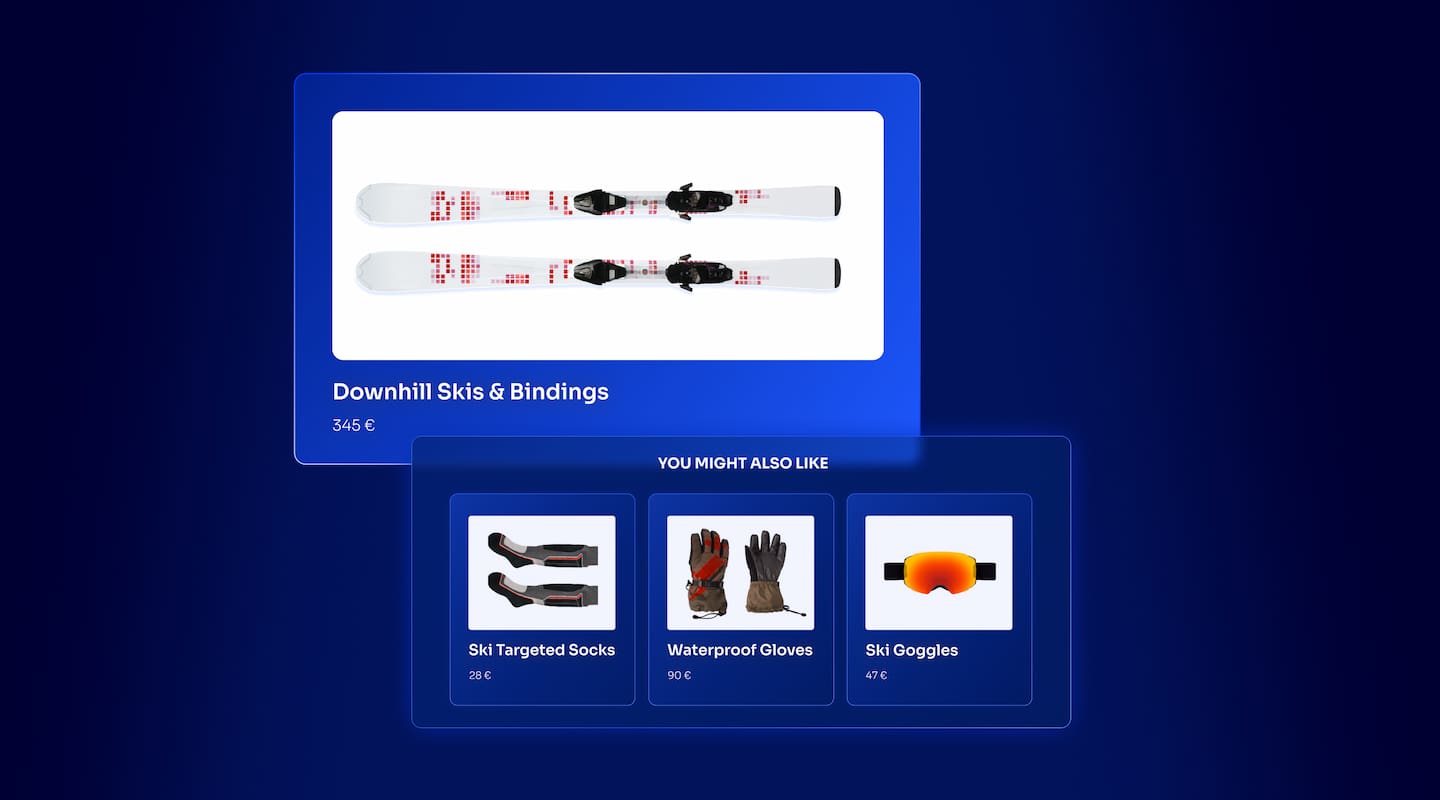Add InstantSearch and Autocomplete to your search experience in just 5 minutes
A good starting point for building a comprehensive search experience is a straightforward app template. When crafting your application’s ...
Senior Product Manager


A good starting point for building a comprehensive search experience is a straightforward app template. When crafting your application’s ...
Senior Product Manager

The inviting ecommerce website template that balances bright colors with plenty of white space. The stylized fonts for the headers ...
Search and Discovery writer

Imagine an online shopping experience designed to reflect your unique consumer needs and preferences — a digital world shaped completely around ...
Senior Digital Marketing Manager, SEO

Winter is here for those in the northern hemisphere, with thoughts drifting toward cozy blankets and mulled wine. But before ...
Sr. Developer Relations Engineer

What if there were a way to persuade shoppers who find your ecommerce site, ultimately making it to a product ...
Senior Digital Marketing Manager, SEO

This year a bunch of our engineers from our Sydney office attended GopherCon AU at University of Technology, Sydney, in ...
David Howden &
James Kozianski

Second only to personalization, conversational commerce has been a hot topic of conversation (pun intended) amongst retailers for the better ...
Principal, Klein4Retail

Algolia’s Recommend complements site search and discovery. As customers browse or search your site, dynamic recommendations encourage customers to ...
Frontend Engineer

Winter is coming, along with a bunch of houseguests. You want to replace your battered old sofa — after all, the ...
Search and Discovery writer

Search is a very complex problem Search is a complex problem that is hard to customize to a particular use ...
Co-founder & former CTO at Algolia

2%. That’s the average conversion rate for an online store. Unless you’re performing at Amazon’s promoted products ...
Senior Digital Marketing Manager, SEO

What’s a vector database? And how different is it than a regular-old traditional relational database? If you’re ...
Search and Discovery writer

How do you measure the success of a new feature? How do you test the impact? There are different ways ...
Senior Software Engineer

Algolia's advanced search capabilities pair seamlessly with iOS or Android Apps when using FlutterFlow. App development and search design ...
Sr. Developer Relations Engineer

In the midst of the Black Friday shopping frenzy, Algolia soared to new heights, setting new records and delivering an ...
Chief Executive Officer and Board Member at Algolia

When was your last online shopping trip, and how did it go? For consumers, it’s becoming arguably tougher to ...
Senior Digital Marketing Manager, SEO

Have you put your blood, sweat, and tears into perfecting your online store, only to see your conversion rates stuck ...
Senior Digital Marketing Manager, SEO

“Hello, how can I help you today?” This has to be the most tired, but nevertheless tried-and-true ...
Search and Discovery writer
What if you had to make an online store (or even a brick-and-mortar) buying decision without first reviewing your personalized recommendations? You know, those data science–driven merchandising ideas for related products, thought up uniquely for you. Those ecommerce-site recommendations for relevant products that are based on machine-learning intelligence generated by tidbits of input data about your user behavior and purchase history.
What if there were not even one artificial intelligence–based recommendation, something along the lines of “You might like…” or “Check out these popular products” or “People who liked this also liked…”? Not even a measly “Frequently bought together.”
Hmm. You’d feel a bit lost. You’d be ambivalent about buying the item, even if its great features were detailed in professional-looking images, the marketing copy was seductive, and the site touted free returns.
Yet if the site’s product recommendation engine had proactively, wholeheartedly taken it upon itself to recommend that specific product, because it intrinsically knows what you want, you wouldn’t have hesitated.
Deep-learning-based recommender systems sure make online shopping easier, don’t they?
Deep-learning-generated recommendations for shoppers and media-site subscribers have become an integral part of the ecommerce discovery and purchase experience. For the best success with your site metrics, the right product recommendation model is something you need to nail. In fact, in one survey, 54% of retailers claimed that product recommendations function as the key driver of a higher average order value.
Everyone’s aware that large-scale companies like Amazon and Netflix have set a high bar when it comes to personalized recommendations — that level of tailored guidance is what people now expect, even if they’re just browsing the websites of smaller companies that don’t have the same ability to implement or budget for state-of-the-art digital resources and functionality.
With online shopping, a relevant recommendation can change everything. Like a personal shopper schooled in your every last like and dislike, recommendations functionality does the searching for you, scouring the site to find what you probably want in terms of information retrieval and then politely suggesting — at the right moment — that you might want to check it out.
So yes, you want to offer the right recommendations that can introduce your customers to the joys of shopping on your site. You want to show products they’d like to consider. And you want them to get used to considering your suggestions, and to come back.
Customer retention is one documented benefit of utilizing personalized recommendations. A 2018 Monetate study found that 55% of return customers to a retail website who interacted with a suggested product (such as by reading the product description) were more likely to make a purchase during their shopping session. And for new customers? A whopping 70%.
In short, an online personalized recommendation is a relevant suggestion generated by a recommendation engine (a.k.a. a recommender system) using an algorithm and filtering options based on what’s known about the customer’s on-site meanderings. Prospective clues:
Recommendation engines must sort through all the available data and come up with their best guesses on what to suggest. There are three different points of focus:
This type of recommendation engine collects and analyzes data on user activities and preferences, surmising what someone likes based on their similarity to other users. Interestingly, the content itself (item, book, or movie) is not considered. Informed by a matrix-style formula, this method applies logic about user preferences among people with similar preferences, plus makes predictions based on earlier activity.
There are two ways of filtering collaboratively: memory based and model based.
Memory-based collaborative filtering identifies clusters of users and looks at user interactions to predict those of similar users. It also identifies clusters of items rated by user A, then uses them to predict interactions of user A with similar item B.
Relying on machine learning and data mining, model-based collaborative filtering is focused on training models to make predictions. For example, it might use interactions with an item to predict liked items. It can recommend larger numbers of items to larger numbers of people
than memory-based collaborative filtering.
You know filtering is based on content when you see “If you like that, you might also like this,” or if you looked at something weeks ago and you’re now getting a nudge to check out a similar item. With content-based recommendations, similar items are grouped according to features. The recommendation algorithms look at customer preferences plus item descriptions (e.g., genre, type, color).
Why utilize only memory or only content collaborative filtering when you can enjoy the benefits of both? Netflix does that. It accounts for users’ interests (collaborative filtering) as well as for movie descriptions and features (content-based filtering).
The right tailored recommendations can make all the difference for your site. When you can use Big Data to impress and keep your customers happy, you’ve attained that lofty goal of engagement. Enough sustained engagement results in a boost in site performance.
And of course, the ultimate payoff is better conversion rates generated by your sustained efforts to be attuned to your customers’ needs from the moment they start searching until they move forward on the cart page, and whether or not they unexpectedly abandon their shopping expedition or buy multiple additional recommended products and then come back the next day to look for more. Ultimately, using personalized recommendations is a win-win for both retailers and shoppers alike.
Because you’ve stuck with us this far, it’s a good bet you’re interested in capitalizing on adding intuitive recommendations. It’s time to go find the best recommendation solution for your site. Which, you might like to know, is functionality that we here at Algolia specialize in, alongside our reputable search technology.
Our tried and tested ecommerce recommendation system does it all: enables fast, scalable product discovery, facilitates first-rate user engagement, ensures repeat customer visits, and maximizes conversion. Our related content model works using a hybrid engine, as well as collaborative filtering and user signals, to deliver high-quality recommendations.
You can display user recommendations where work the best, whether that’s on the product page, home page, or product category page. You can even integrate Recommend to show complementary products during checkout to increase your average order value. Your developers can utilize our reliable APIs to build and refine your best-possible recommendation experiences.
Using Recommend to suggest similar products with different colors and features helps people continue finding relevant information and ultimately make the best purchase without having to redo their search from the home page. How do we know Recommend is such a stellar bet for building recommender systems that strengthen personalized experiences? We’ve gathered some convincing statistics with the help of our customer data.
Recommend used strategically enhances customer engagement at every touchpoint. We’ve calculated that this leads to a:
Of course ecommerce stores love recommending items, but what about things like movie recommendations? No matter which industry you’re in and whether you’re most focused on higher cart values, better customer retention, or higher conversion, you can provide delightful user-experience optimization that gets results. Algolia Recommend will expertly build models from your index and user events based on supervised machine-learning algorithms.
Let’s chat about how Algolia Recommend can help you enhance your customer experience and grow your business. We’ll give you a personalized demo and you can try us free with 10,000 recommendation requests per month. Find out how you can drive more traffic and increase sales with the right recommendation strategies. Who knows? Like many of our clients, you could soon be dramatically improving your customer journey and then personally recommending Algolia yourself.
Powered by Algolia Recommend